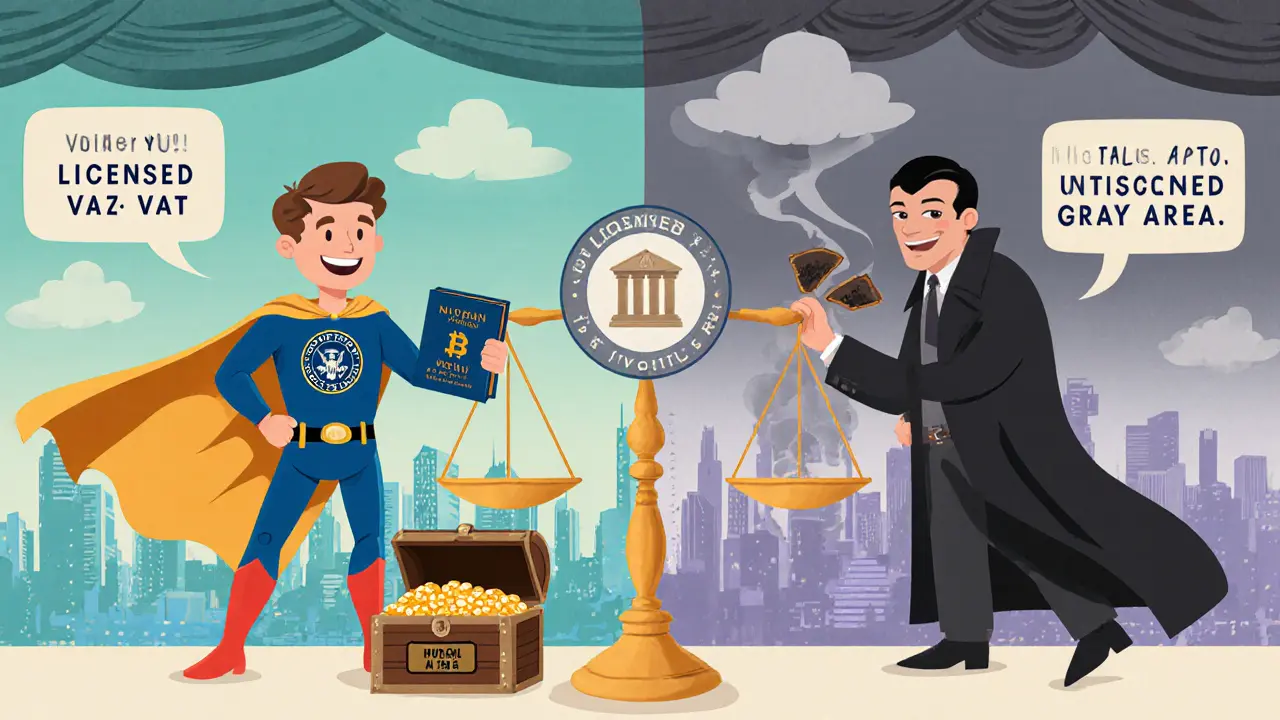Crypto Payment Compliance Checker
Compliance Result
TL;DR
- Crypto payments are not illegal in Nigeria, but they are not legal tender.
- The Investments and Securities Act (ISA) 2025 classifies digital assets as securities, putting the Securities and Exchange Commission (SEC) in charge.
- All exchanges and Virtual Asset Service Providers (VASPs) must register with the SEC; unlicensed platforms risk heavy fines or shutdown.
- From Jan12026 a tax regime treats crypto as property - only sales or swaps are taxed.
- Licensed local exchanges (e.g., Quidax, Busha) can link to banks, while international unlicensed services face restrictions.
What "crypto payments in Nigeria\" Actually Means
When we talk about crypto payments in Nigeria, we refer to the use of digital assets-like Bitcoin, Ethereum or stablecoins-to settle goods, services or remittances. The Nigerian government does not treat any cryptocurrency as official currency, so you can’t pay the federal tax office with Bitcoin. However, the activity isn’t banned either. The key is doing it through a provider that meets the regulatory requirements set out after March2025.
Regulatory Landscape After ISA2025
In March2025 President Bola Ahmed Tinubu signed the Investments and Securities Act (ISA) 2025\. The law officially recognizes digital assets as securities, which shifted the market from a legal gray area to a regulated sector. Three agencies now share oversight:
- Securities and Exchange Commission (SEC)\: Primary regulator for digital assets. All crypto exchanges and VASPs must obtain a license.
- Central Bank of Nigeria (CBN)\: Controls monetary policy and ensures crypto activity doesn’t threaten financial stability. Since the December2023 VASP Guidelines, banks can hold accounts for SEC‑licensed crypto firms.
- Nigerian Financial Intelligence Unit (NFIU)\: Enforces AML/CFT rules for crypto businesses, working closely with the Economic and Financial Crimes Commission (EFCC).
This multi‑agency model means a licensed crypto service can operate alongside traditional banks, while regulators keep a tight watch on fraud and money‑laundering risks.
Licensing Requirements for Crypto Payment Providers
Under the ISA2025, any entity that offers crypto‑related services must register with the SEC and follow the Digital Assets Rules. The process includes:
- Submit a detailed business plan, including AML/CFT policies and technology architecture.
- Demonstrate adequate capital - at least ₦100million for exchanges, ₦50million for payment‑only VASPs.
- Pass a security audit conducted by an accredited firm.
- Obtain a background check for senior executives from the NFIU.
Early approvals went to home‑grown platforms like Quidax\ and Busha\. Licensing can take six months or longer because regulators perform rigorous vetting. Failure to register triggers an initial ₦10million fine plus ₦1million for every additional month of non‑compliance, and the SEC can suspend or revoke the license outright.

Tax Regime Starting 2026
June2025 saw the passage of the Nigerian Tax Administration Act (NTAA)2025, which creates a clear tax treatment for crypto. Key points:
- Crypto assets are treated as property, not currency. Holding them incurs no tax.
- Taxable events are sales, swaps, or any transaction that generates a profit.
- Individuals pay personal income tax on gains, up to a 25% marginal rate.
- Companies earning between ₦25million and ₦100million pay a 20% corporate tax; above ₦100million the rate rises to 30%.
- All crypto‑related service providers must add a 7.5% VAT on the fees they charge.
Experts call this a “progressive” regime because it taxes only realized gains and provides a clear filing structure for businesses.
How to Make a Legal Crypto Payment in Nigeria Today
Follow these steps to stay on the right side of the law:
- Choose a SEC‑licensed exchange or VASP (e.g., Quidax, Busha, or any platform displaying the SEC registration number).
- Create an account and complete KYC/AML verification. You’ll need a valid ID, proof of address, and possibly a tax identification number.
- Link a Nigerian bank account. Thanks to the CBN’s 2023 guidelines, licensed VASPs can hold NUBAN accounts, making fiat‑to‑crypto conversion seamless.
- Convert Naira to the desired crypto. Keep a transaction receipt that shows the amount, date, and exchange rate.
- When paying a merchant, request the wallet address and send the exact amount. The merchant should confirm receipt on the blockchain.
- Record the transaction for tax purposes. If you later sell or swap the crypto, you’ll need the original purchase price to calculate taxable gains.
Using an unlicensed platform is risky: the SEC can freeze the funds, and you won’t have legal recourse if the service disappears.
Risks, Compliance Tips, and Common Pitfalls
Even with a license, crypto payments carry specific risks in Nigeria:
- Regulatory delays: Licensing can be slow, so don’t assume a new platform is automatically compliant.
- Higher fees: Licensed providers often charge extra to cover compliance costs and the 7.5% VAT on fees.
- Cross‑border limitations: International exchanges that haven’t sought Nigerian licensing may block Naira deposits or withdrawals.
- Fraud prevention: The SEC and EFCC have access to telecom data for investigating Ponzi schemes; always verify the legitimacy of a counter‑party.
Pro tip: keep a spreadsheet of every crypto transaction, including the fiat amount, date, and counterparties. This not only simplifies tax filing but also proves you’re following AML rules.
Future Outlook for Crypto Payments
Analysts see three trends shaping the next few years:
- Deeper bank integration: As more banks open accounts for licensed VASPs, the user experience will resemble traditional online banking.
- Regulatory fine‑tuning: Expect clearer guidance on NFTs, DeFi protocols, and stablecoin reserves as the SEC gains practical experience.
- Competitive edge for locals: Domestic exchanges that meet compliance will dominate retail crypto payments, while foreign platforms may either license locally or focus on peer‑to‑peer methods.
Overall, the legal framework now provides a solid foundation for growth, but success hinges on how quickly operators adapt to compliance costs and how regulators balance innovation with consumer protection.
Comparison: Licensed vs. Unlicensed Crypto Services
| Feature | Licensed (SEC‑registered) | Unlicensed |
|---|---|---|
| Legal status | Allowed to operate, can offer fiat‑to‑crypto services | Operating in a legal gray area; subject to shutdown |
| Bank account access | Can hold NUBAN accounts via CBN‑approved banks | Usually no direct bank integration |
| Compliance burden | AML/KYC, annual reporting, VAT on fees | Little to no formal compliance (higher fraud risk) |
| Fee structure | Higher fees + 7.5% VAT on service charges | Often lower fees but hidden costs for withdrawals |
| Consumer protection | SEC oversight; possibility of dispute resolution | No regulatory recourse if platform disappears |

Frequently Asked Questions
Is it illegal to use Bitcoin for everyday purchases in Nigeria?
No. Bitcoin and other cryptocurrencies are not illegal, but they are not recognized as legal tender. You can use them for private transactions as long as you go through a SEC‑licensed exchange or payment processor.
Do I need a license to accept crypto payments as a small business?
If you simply receive crypto directly to a wallet you control, no license is required. However, if you provide a payment gateway, invoicing service, or convert crypto to Naira for your customers, you must partner with a SEC‑registered VASP.
What happens if I use an unlicensed exchange?
The SEC can freeze the exchange’s assets and issue fines. Users may lose access to their funds with little legal recourse, and AML authorities could request your transaction data for investigations.
How will taxes affect my crypto trading after 2026?
Only when you sell, swap, or use crypto to buy goods/services that generate a profit will you owe tax. Individual gains are capped at a 25% personal income tax rate; businesses must also add 7.5% VAT on any fees they charge.
Can I link my Nigerian bank account to a foreign crypto exchange?
Only if the foreign exchange obtains a SEC license and opens a local NUBAN account. Otherwise, most banks block direct Naira transfers to unlicensed platforms.
Bottom line: crypto payments Nigeria are allowed, but the safest route is to stick with SEC‑licensed providers, keep solid records, and stay ahead of the 2026 tax rules. This approach protects you from fines, gives you access to banking services, and lets you enjoy the speed and low cost that digital assets offer.


Chris Hayes
June 26, 2025 AT 21:51The framework laid out by the SEC really shifts the playing field; any platform that skirts registration is essentially gambling with users' assets.
Aditya Raj Gontia
June 30, 2025 AT 23:51From a compliance‑engineer perspective, the AML/KYC matrix introduced post‑March 2025 necessitates a layered risk‑assessment protocol that most unlicensed VASPs simply cannot sustain without incurring prohibitive operational overhead.
mannu kumar rajpoot
July 5, 2025 AT 01:51Honestly, if you think the SEC’s watchlist is a suggestion, you’re ignoring the fact that they have deep‑state ties to the NFIU and can trace crypto flows via telecom metadata – better keep your private keys offline.
Tilly Fluf
July 9, 2025 AT 03:51It is commendable that many Nigerian merchants are beginning to adopt regulated crypto gateways; this measured approach not only safeguards consumers but also fosters trust in the nascent digital‑asset ecosystem.
Darren R.
July 13, 2025 AT 05:51The legal scaffolding erected by the Investments and Securities Act of 2025 represents more than a regulatory checkpoint; it is a philosophical statement about the sovereignty of financial innovation in Nigeria.
First, the act categorises digital assets under the umbrella of securities, thereby subjecting them to the same fiduciary duties imposed on traditional equity markets.
Second, the tri‑agency oversight model-SEC, CBN, and NFIU-creates a system of checks and balances that discourages unilateral policy drift.
Third, the licensing capital thresholds (₦100 million for exchanges, ₦50 million for payment‑only VASPs) serve as a financial gatekeeper, ensuring that only entities with substantive backing can operate at scale.
Fourth, the mandatory annual audit by an accredited firm is not a bureaucratic formality but a protection mechanism for end‑users against systemic risk.
Fifth, the imposition of a 7.5 % VAT on service fees, while increasing costs, also signals the government's intent to treat crypto services as taxable economic activity.
Sixth, the tax regime of 2026, treating crypto as property, aligns Nigeria with international best practices, removing ambiguity around capital gains.
Seventh, the requirement for detailed transaction receipts creates an audit trail that aids both tax compliance and anti‑money‑laundering efforts.
Eighth, the provision allowing licensed VASPs to hold NUBAN accounts bridges the fiat‑crypto divide, offering users a seamless conversion experience.
Ninth, the penalties for non‑compliance-₦10 million initial fine plus ₦1 million per month-serve as a deterrent against rogue operators.
Tenth, the SEC’s authority to freeze assets of unlicensed platforms provides a powerful enforcement tool to protect investors.
Eleventh, the regulatory clarity has encouraged domestic firms like Quidax and Busha to invest in infrastructure, spurring competition and innovation.
Twelfth, the expected forthcoming guidelines on NFTs and DeFi will further cement Nigeria’s position as a forward‑looking jurisdiction.
Thirteenth, market participants who ignore these frameworks risk not only financial loss but also reputational damage that can be irreversible.
Fourteenth, the collaborative environment between banks and licensed VASPs promises an ecosystem where crypto payments can coexist with traditional banking services.
Finally, the success of this regulatory model hinges on continuous stakeholder dialogue, ensuring that the rules evolve in tandem with technological advances.
Hardik Kanzariya
July 17, 2025 AT 07:51For anyone feeling overwhelmed, start by writing down each crypto transaction in a simple spreadsheet; this habit will pay off when tax season arrives and also demonstrates good AML practice.
Shanthan Jogavajjala
July 21, 2025 AT 09:51Look, the jargon aside, the real takeaway is that a ‘licensed’ badge isn’t just a marketing sticker-it’s a legal shield that can prevent your assets from being frozen overnight.
Jack Fans
July 25, 2025 AT 11:51Step‑by‑step, here’s how to stay compliant:
1. Register on a SEC‑licensed exchange such as Quidax or Busha.
2. Complete KYC with a valid ID and tax identification number.
3. Link your NUBAN bank account via the exchange’s portal.
4. Keep the transaction receipt-date, amount, and exchange rate.
5. Report any sale or swap on your annual tax filing.
This workflow minimizes risk and keeps you on the right side of the law.
Adetoyese Oluyomi-Deji Olugunna
July 29, 2025 AT 13:51While the average user may view licensing as a bureaucratic hurdle, connoisseurs recognise it as a hallmark of operational excellence, distinguishing the elite from the merely opportunistic.
Krithika Natarajan
August 2, 2025 AT 15:51Keep good records.
Ayaz Mudarris
August 6, 2025 AT 17:51It is both an intellectual and pragmatic imperative for stakeholders to internalise the regulatory cadence; by doing so, they not only safeguard personal assets but also contribute to the macro‑economic stability that underpins sustainable growth.
Irene Tien MD MSc
August 10, 2025 AT 19:51Ah, the grand tapestry of crypto regulation in Nigeria-so meticulously crafted that it feels like a covert narrative penned by shadowy cabals who delight in watching us chase ever‑shifting compliance checklists while the real power brokers sip cocoa in secret boardrooms, laughing at our earnest attempts to navigate a labyrinth of VAT, AML, and NFIU mandates that change as often as the daily market charts swing, all the while the SEC’s licensing fee resembles a clandestine tribute to an unseen fiscal deity who demands obeisance in the form of ₦100 million capital deposits, effectively turning the crypto sphere into an aristocratic club where only the well‑heeled may enter, leaving the rest to barter on the black market, where anonymity is a myth and every transaction is a potential breadcrumb for the ever‑watchful eye of the economic police; and let us not forget the 2026 tax regime that treats crypto as property, a brilliant stratagem that conveniently aligns with global standards while simultaneously providing a veneer of legitimacy to a system that, at its heart, remains a playground for the audacious.
kishan kumar
August 14, 2025 AT 21:51In summation, adherence to the SEC licensing edicts not only fortifies one’s legal posture but also elevates the collective credibility of Nigeria’s digital‑asset market. 😊